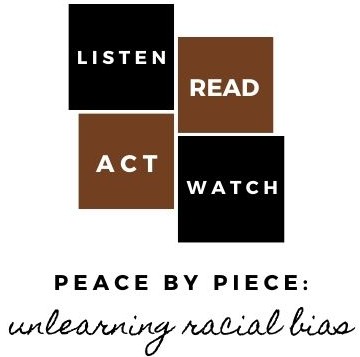This post is part of a year-long series. If my work is helpful for you, consider a contribution through Venmo to support this crucial work of unlearning racial bias.
Two weeks ago, in piece 16, I shared a few podcasts I listen to that keep me aware of points of view different from my own. I asked when you sense yourself feeling resistant to new ideas and perspectives, where that resistance comes from. Such an introspective state of mind and active focus on your physiological reactions to new-to-you ideas is necessary for this week’s suggested resources, which begin with a thorough examination of the case for reparations to be paid to black Americans.
To me, Ta-Nehisi Coates is one of those rare writers who is able to weave literature from nonfiction prose. I find his writing style to be so keen that at times I am astonished that words can arrange themselves in the way he manipulates them. He takes current and historical events that at a glance seem mundane because of the analytical takes I’ve read on those same events before, and he makes them shimmer with the newness of his own unique insight. My introduction to Coates’s writing was a lengthy, weighty Atlantic article entitled “The Case for Reparations.” Because I am a slow, deliberate reader, it took me several reading sessions to make my way through Coates’s meaty treatise. The lens through which he clarifies how black Americans arrived at the here and now from the there and then, is sharp & crisp in its focus. For those reasons, “The Case for Reparations” is the first resource I am suggesting this week. I hope that even if you find the title off-putting and do not agree with the article’s thesis that you will read it anyway. It is at once poetry and prose, historic lens and current events examination, objective portrait and intimate biography. Let it teach you, hurt you, change your mind.
Coates’s memoir Between the World and Me captures the emotional struggle black Americans endure when they have the talk with their children – especially their sons. In this book, Coates writes a letter to his teenage son, who at the book’s outset is heartbroken and confused over the outcome of the trial following Michael Brown’s murder in Ferguson. Although Between the World and Me is a slim volume, the emotional weight of its honest portrayal of black American life; the tenderness with which Coates approaches these difficult subjects on behalf of his beloved adolescent son; the bleak, necessary acceptance of black Americans’ disparate, disproportionate mistreatment across time and geography, kept me from taking it all in at once. Instead, I bought the book, began it, and then put it down and walked away – feeling eerily like a stranger had soulfully penned the thoughts in my head, some of which I’d never even admitted to myself. Coates makes connections in this book that resonate with rumblings of turmoil and confusion I’ve at times felt within but been for varying reasons unable to give voice. Thus, Between the World and Me is the second resource I am recommending this week.
Between the World and Me borrows its title from a poem of the same name, written by Richard Wright. Like Coates’s writing in “Reparations” and in his book, Wright’s acuity is disarming and at times devastating. If you’re able to read this poem without tearing up a time or two, maybe take another pass at reading it; you might be missing something between the lines. Richard Wright’s poem “Between the World and Me” is my third resource recommendation this week. Read it slowly and deliberately, with an open heart and a focused eye. Rather than getting and staying lost in the juxtaposition of abstract and concrete images and symbolism, yield to the larger truth represented in Wright’s words: a collective black American history of lynching, dispossession, and utter shock at continually being dehumanized for the sole crime of possessing black skin.
As you read one or all of these resources in the coming week, I hope you will sit with these questions:
- What are your feelings and thoughts regarding reparations? Have you studied the topic and how the American government has historically addressed this topic? If your emotional response is defensiveness or self-preservation because you don’t want the government dipping into your pocket to right wrongs you haven’t committed, have you questioned why you feel that way?
- Is it possible to truly move forward in a positive direction as a country, if we haven’t collectively done the work of examining our past, warts and all?
- In your own life, are you able to maintain healthy interpersonal relationships without reparative, restorative work when disagreements arise and hurts are inflicted?
Come back next week, y’all. We’ll keep working to examine our past in light of our present and our present in light of our past, actively seeking to create peace, one piece at a time.
